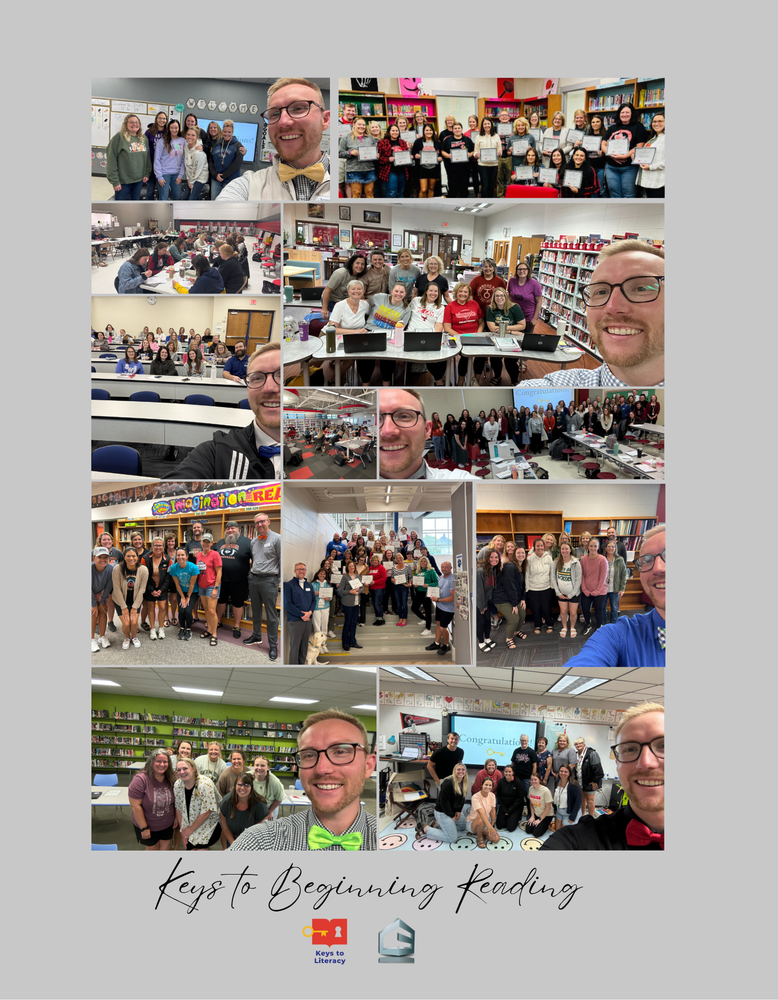By Jim Addison, Bow Tie Guy
Act 20.
By now, most of you reading this are either well aware of or actively engaged with this landmark legislation, passed in July of 2023. With literacy rates staggering at best, states across the country have moved quickly to propose and implement new laws aimed at strengthening early foundational reading skills. One such requirement under Wisconsin’s Act 20 is that all educators must begin a Center for Effective Reading Instruction (CERI) approved training by July 1, 2025.
While some CESA 3 districts had already completed qualifying trainings before Act 20 was enacted, many others partnered with CESA 3 to fulfill the requirement through the Keys to Beginning Reading training. Over the past two years, CESA 3 has proudly trained more than 225 educators across 14 districts. Traveling from district to district, I was continually reminded that this region is filled with hardworking, dedicated, kind, and passionate educators.
The training itself, a combination of asynchronous modules and in-person facilitated sessions, required more than 40 hours of time and focus from already very busy professionals. So, what’s the big deal about this training? And is this “science of reading” thing really new?
The science of reading is not a fad or a buzzword. It’s a deep and growing body of research that stretches back decades, if not more than a century. It helps us understand how proficient reading and writing develop, why some students struggle, and how we can use evidence-based strategies to improve outcomes. As renowned researcher Keith Stanovich once said, scientific research is like a mosaic and that each piece of evidence, no matter the result, helps us better see the full picture.
CERI-approved training, such as Keys to Beginning Reading, is designed to translate that research into practical, powerful tools for educators. It equips teachers to understand why a curriculum uses certain routines, how to deliver concepts effectively, and how to identify and address gaps in their instruction or materials.
Now that the region is trained, reading outcomes should skyrocket, right? That is an exciting thought and while that remains the mission to equitably serve all students, it may not be that simple.
As Fixsen et al. (2005) remind us, professional development alone is not enough to bring about sustained improvements in school practices. Training is a strong starting point, but it’s a poor place to stop. Now, as educators across the region wrap up trainings like LETRS, Top 10 Tools, and Keys to Beginning Reading, we’re entering a critical phase where we must examine, refine, and even abandon practices in order to create lasting change.
So how do we move from learning to doing? Coaching.
According to Freeman et al. (2017), coaching plays a crucial role in bridging the gap between professional development and classroom practice. It ensures the knowledge gained in training is successfully implemented and done so with fidelity and sustainability.
Coaching isn’t just about a one-on-one conversation after a lesson (although that can be part of it). Effective coaching happens at every level: school, district, regional, and state. It involves analyzing data, setting goals, auditing programs and resources, aligning systems, and providing meaningful feedback.
As Fullan and Knight (2011) note, “School improvement will fail if the work of coaches remains at the one-to-one level.” Coaches must be seen as system leaders, guiding not only instructional change, but also organizational and systems-level reform.
It’s been an honor to work alongside so many incredible educators over the past two years. I’ve been inspired by your willingness to dig into the research, apply new strategies, and challenge yourself to grow. As we move into this next chapter of Act 20 implementation, let’s keep the momentum going and nurture our systems to reach every possible student.
Because training gets us started. But it’s thoughtful implementation, strong leadership, and strategic coaching that get us to lasting change.
References
Fixsen, D. L., Naoom, S. F., Blase, K. A., Friedman, R. M., & Wallace, F. (2005). Implementation research: A synthesis of the literature (FMHI Publication No. 231). University of South Florida, Louis de la Parte Florida Mental Health Institute, The National Implementation Research Network.
Freeman, J., Sugai, G., Simonsen, B., & Everett, S. (2017). MTSS coaching: Bridging knowing to doing. Theory Into Practice, 56(1), 29–37. https://doi.org/10.1080/00405841.2016.1241946
Fullan, M., & Knight, J. (2011). Coaches as system leaders. Educational Leadership, 69(2), 50–53.

